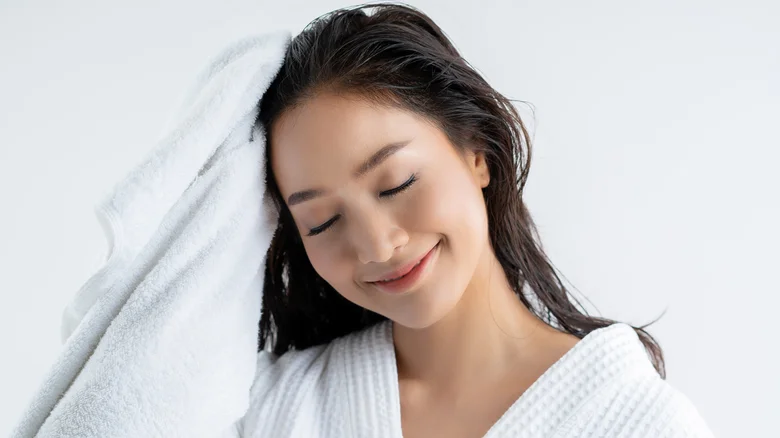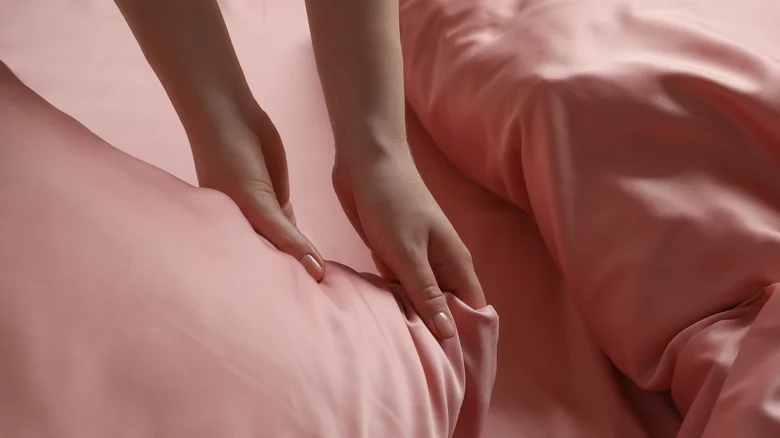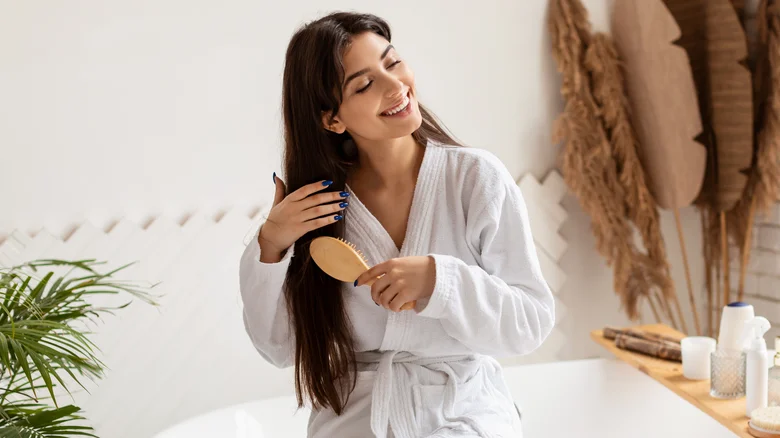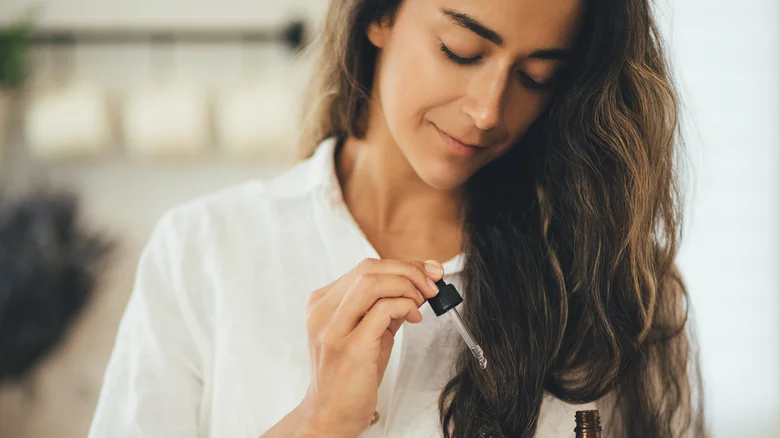Nighttime Routines For Seriously Gorgeous Hair
Establishing beauty and health routines is a part of life for most of us, and making sure our hair can make it through the night’s sleep relatively unscathed is an important part of keeping it as healthy as possible. Of course, figuring out what that nighttime routine should look like isn’t always intuitive.
Many of us have a bedtime skin routine, so it makes sense to adopt one for our hair, too. Different hair textures and hairstyles have different needs, and it’s important to understand your hair before settling on what you think will work for you.
Here are several ideas to help you protect your hair as much as possible while you sleep. After all, our hair is pretty important, and taking care of it can improve how we look and feel during the day. From making sure you go to bed with dry hair to choosing the right hair serums or dry shampoos for you, these tips should help you out.
Always dry your hair before going to sleep

If you’re one of those people who likes to wash your hair at night, there’s one thing that’s crucial to keep in mind if you want to keep it healthy: don’t go to bed with wet hair… ever. It turns out that our hair is at its weakest when it’s wet. There’s a scientific reason for that, as MarthaStewart.com shares. It turns out that the hydrogen bonds in our hair are more flexible when hair is wet, which means hair is more prone to stretching, which leads to breakage.
One solution is to dry your hair with a hairdryer before you get between the sheets, but not everyone wants to apply heat to their hair every time they wash it (and some of us wash our hair frequently). If that’s the case for you, there are other options before hitting the pillow with soaking wet hair. Microfiber hair towels are great for all hair types (and especially curly and thick hair), and wrapping your hair in one will speed up the drying process considerably.
Add satin pillowcases to your bed

If you’re having trouble keeping your hair looking good while you sleep, the culprit might be a lot closer than you think: your pillowcase. To understand exactly what the problem is, Good Housekeeping spoke to New York-based dermatologist Dr. Neal Schultz, who explained that cheap cotton and blend pillowcases can wreak havoc on both our skin and our hair.
The best alternative might be a silk pillowcase. As the site explains, silk’s ultra-smooth texture helps keep frizz at bay. Plus, your hair won’t snag or break on silk like it can with cotton threads, allowing you to sleep easy and sport a gorgeous, healthier mane the next morning.
Dr. Schultz also tells Good Housekeeping that silk helps our hair retain its moisture, unlike cotton pillowcases (which can strip away moisture). If you’ve been waking up with dry hair that’s prone to breaking, examining your pillowcase might be the best first step you can take.
Lightly brush your hair before bed to redistribute oils

Many of us brush or comb our hair regularly, but sometimes brushing too much can be bad, especially if we’re not careful enough with our hair. However, when it comes to preparing our hair for ideal sleeping conditions, a light brushing won’t hurt and can actually help a lot.
As the team behind the Hotheads hairbrush have explained, there are plenty of good reasons to brush our hair regularly. Doing so is like giving our scalp a massage, which in turn can help us to be less stressed (which is always ideal before we go to sleep). Brushing is also a great way to remove dead skin from our scalp and is much gentler than scratching our head with our nails.
The site goes on to add that gently brushing before bed is a great way to transport our natural hair oils from the roots to the tips, which helps to balance the overall oiliness of our head (and helps us avoid having oily roots).
Braid your hair instead of tying it up

As tempting as it may be to pile all your hair up on top of your head while you sleep, doing so can cause a lot more damage than you might think. Instead of putting your hair up in a bun and going off to dream, consider braiding your hair.
As Shaz and Kiks explain, there’s a very real reason why braiding your hair before bed is a great idea. Many of us toss and turn throughout the night, and all that movement can cause a lot of damage to our hair. When we have our hair braided, the same movement isn’t as forceful; the braid helps prevent the hair from rubbing too much on the pillowcases, which in turn limits hair breakage.
Dr Apoorva Shah, who founded the RichFeel Hair Clinic in Mumbai, echoed this advice in an interview with Healthshots. She explains that as well as protecting hair from breakage, braids offer other benefits. Dr. Shah says, “In fact, a loose braid can work with the body’s natural process to stimulate hair growth.”
Use your hair serums and oils at night

Many people are familiar with using hair serums and oils during the day to protect themselves from the elements, especially sun exposure. Our hair often encounters a lot of potentially damaging elements during the day, and many serums and oils can help combat them.
However, as Hair.com points out, nighttime is when our hair has a chance to repair itself. The site spoke to hair expert Erika Dawn Shear, who explained how beneficial hair serums and oils can be at night, too. “These eight hours of sleep give our hair a break from heat, styling, and daily health risks — the optimal time to use a repairing nighttime serum,” Shear explained.
There are plenty of nighttime hair serums and oils to try, each designed for a different hair type and a different hair goal. Many, like the Kérastase Nutritive 8H Magic Night Hair Serum, are designed to both hydrate and detangle hair while we sleep, making using a serum a powerful part of anyone’s pre-bed hair care routine.
Find ways to de-stress at night

When it comes to caring for our hair at bedtime, the solution sometimes has little to do with how we treat our hair and more to do with how we treat ourselves. A 2007 study by the American Academy of Dermatology found that stress plays a major role in the overall health of our hair, skin, and nails and that one thing we can all do before bed to help our hair is to try to de-stress as much as possible.
Miami, Florida dermatologist Flor A. Mayoral explains in the study that one of the reasons people lose their hair is due to massive levels of stress. If you constantly deal with high levels of anxiety and stress and think your hair might be suffering because of it, Dr. Mayoral also offers some tips on how to manage that stress and keep your hair (and mind) healthy, including regular exercise to release endorphins.